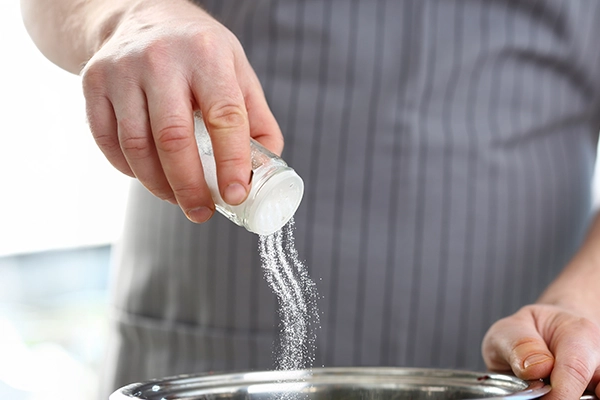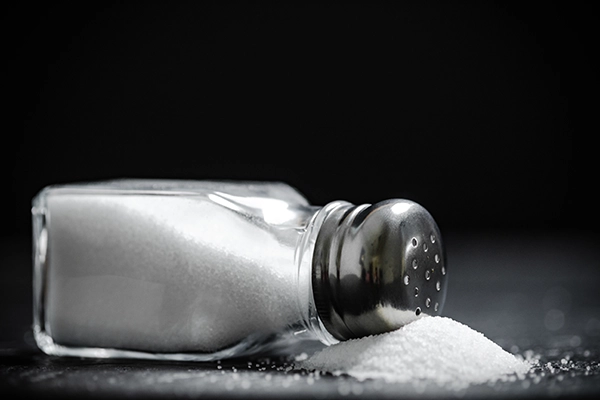Salt is one of the oldest and most widely used food additives in the world. Although salt is essential for the body to function properly, consuming too much of it can have serious side effects. In this article, we will discuss the salt side effects, its health benefits and the appropriate amount of daily consumption.
Salt Side effects
Although salt has its benefits, consuming too much of it can lead to serious health problems. Here are some of the salt side effects:

Increased blood pressure
One of the salt side effects is increased blood pressure. Consuming too much salt causes the body to retain more fluids, and this increase in blood volume leads to an increase in blood pressure.
Increased risk of heart diseases
High blood pressure damages the walls of blood vessels over time and this can lead to cardiovascular diseases.
Possibility of kidney stones
High salt consumption can increase the excretion of calcium through urine, which increases the possibility of kidney stones.
Fluid retention and swelling
Too much salt causes the body to retain more fluid, which can lead to swelling and water retention in the body.
Salt Benefits and daily consumption
Salt, especially sodium chloride, is one of the important electrolytes in the body, which plays a vital role in maintaining the balance of body fluids and the proper functioning of muscles and nerves. Without enough salt in the diet, the body may experience problems such as low blood pressure, muscle weakness, and digestive problems.
Adjusting the balance of body fluids
Sodium in salt helps to keep fluids in the body balanced. This fluid balance is very important to maintain kidney function and prevent dehydration.
Proper functioning of nerves and muscles
sodium and potassium are two substances that help transmit nerve messages. These substances also help in the contraction and expansion of muscles.
Improving the taste of food
Salt, as an additive, improves the taste of food, and many foods do not reach their natural taste without salt.
How much salt per day should we consume?
Considering the salt side effects, the question that arises is how much salt per day should we consume? The World Health Organization recommends that adults should not consume more than 5 grams (about one teaspoon) of salt per day. This amount includes salt that is naturally present in foods and salt that is added to foods. Determining the appropriate amount of salt in the daily diet is an important challenge in maintaining health. The main question is how much salt per day should we consume? According to the recommendation of the World Health Organization, the daily consumption of salt should not exceed 5 grams (equivalent to one teaspoon). This amount provides about 2000 mg of sodium, which is enough for the normal functioning of the body. Consuming more than this amount can lead to salt side effects, including increased blood pressure and risk of cardiovascular disease. On the other hand, the health salt benefits, such as regulating body fluid balance and transmission of nerve signals, should not be overlooked. Therefore, maintaining a balance in salt intake is the key to enjoying its benefits and avoiding its side effects.
Which Salt is better?
In Faraz Hypermarket, you can find various products with controlled salt content. Knowing the salt side effects and its benefits for health will help you choose healthy foods. When grocery shopping, look at nutrition labels to find out how much salt per day you’re consuming. By choosing low-salt products from Faraz Hypermarket, you can enjoy the benefits of salt and at the same time, avoid the dangers of excessive consumption. Your health starts with smart choices above.
How to control your salt intake?
Consuming too much salt can have serious side effects on your health, including increased blood pressure and risk of heart disease. To avoid these salt side effects and enjoy the salt benefits in a balanced way, it is necessary to control the consumption of salt in the diet. Here are some ways to reduce salt consumption:
1. Check nutrition labels: When buying food products, pay attention to nutrition labels. Many packaged foods contain high amounts of salt. Try to choose products with less sodium content.
2. Add less salt to food: One of the easiest ways to reduce salt intake is to add less salt while cooking or serving. Using aromatic spices and vegetables can be a good substitute for salt and reduce salt consumption without reducing the taste of food.
3. Limit processed foods: Prepared foods, canned foods, and meat products are often high in salt. Instead of these foods, use fresh and natural foods that are naturally lower in salt content.
4. Eat low-salt foods: Look for foods that are naturally low in salt. Fruits, fresh vegetables, and whole grains are healthy choices that help control salt intake.

5. Change slowly: If you are used to consuming a lot of salt, try to reduce the amount gradually. By gradually reducing the amount of salt in your food, your taste buds will gradually become accustomed to the lower salt levels.
6. Remove the salt shaker from the table: Not placing the salt shaker on the table can prevent you from adding extra salt to your food and help reduce salt consumption.
By following these strategies, you can control your salt intake and avoid the salt side effects and at the same time benefit from the salt benefits in an appropriate amount. It’s important to remember that being aware of how much salt per day you consume can have a huge impact on improving your health.
Conclusion
In conclusion, proper understanding of the salt side effects and its health benefits plays a vital role in maintaining our health balance. Although salt is necessary for the body to function properly, consuming too much of it can have serious consequences. The key question is how much salt per day should we consume? Global recommendations emphasize consuming a maximum of 5 grams of salt per day. By observing this amount, we can benefit from the salt benefits and at the same time, avoid the dangers of excessive consumption. Knowing the hidden sources of salt in your diet and making smart food choices are the keys to achieving this balance. Remember that our health depends on our daily nutritional decisions, including the amount of salt we consume.










